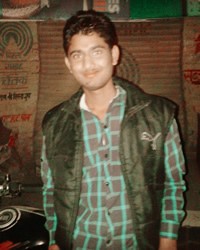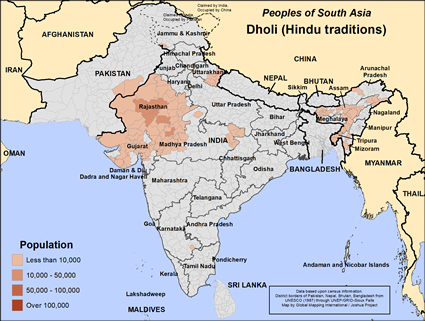Dholi (Hindu traditions) in India

Photo Source:
Anonymous
|

Map Source:
People Group data: Omid. Map geography: UNESCO / GMI. Map Design: Joshua Project.
|
| People Name: | Dholi (Hindu traditions) |
| Country: | India |
| 10/40 Window: | Yes |
| Population: | 240,000 |
| World Population: | 240,000 |
| Primary Language: | Hindi |
| Primary Religion: | Hinduism |
| Christian Adherents: | 0.00 % |
| Evangelicals: | 0.00 % |
| Scripture: | Complete Bible |
| Ministry Resources: | Yes |
| Jesus Film: | Yes |
| Audio Recordings: | Yes |
| People Cluster: | South Asia Dalit - other |
| Affinity Bloc: | South Asian Peoples |
| Progress Level: |
|
Introduction
The name of the Dholi comes from the word “dhol”, meaning a type of drum. This is not surprising, since the Dholi have been drummers and musicians in India for centuries. They play drums during weddings and other festive occasions. The Dholi claim to have come from the powerful Rajput communities, but this is doubtful since they are currently a “scheduled caste.” Scheduled castes receive special consideration for public jobs and university admissions. Like many Hindu communities, the Dholi perceive themselves as being higher on the Hindu social ranking order than others perceive them.
Ministry Obstacles
Most of the Dholi live in rural parts of India's scenic Rajasthan state. Smaller groups also live in the Indian states of Madhya Pradesh, Gujarat and Assam. These states have very few Christian believers, so the Dholi will probably never meet one.
Outreach Ideas
Pray for the Followers of Christ
Pray for the Entire People Group
Pray for the Lord to send workers to the Dholi to tell them of Jesus.
Pray that Christian materials in Hindi and Marwari would become abundantly available to the Dholi.
Pray for the Lord to send them literacy teachers.
Pray for spiritual hunger for the Dholi so that they will desire the word of God.
These Hindus listen to the radio and watch TV in Hindi. Pray for them to hear the gospel through Christian radio.